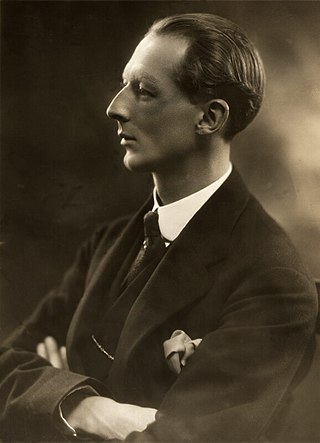Evan Morgan, 2nd Viscount Tredegar
Welsh poet and author From Wikipedia, the free encyclopedia
Evan Frederic Morgan, 2nd Viscount Tredegar (13 July 1893 – 27 April 1949) was a Welsh peer, poet and eccentric. Following the death of his father on 3 May 1934, Morgan became the 2nd Viscount and 4th Baron Tredegar, and the 6th Morgan Baronet. Morgan was also known to his friends as Evan Tredegar.[1]
The Viscount Tredegar | |
|---|---|
 Viscount Tredegar, 1923 | |
| Born | 13 July 1893 33 Cadogan Terrace, London |
| Died | 27 April 1949 Honeywood House, Dorking |
| Notable work | Fragments |
| Title | 2nd Viscount Tredegar, 4th Baron Tredegar, 6th Baronet Morgan |
| Spouse | Lois Sturt (m. 1928; div. 1937) Princess Olga Dolgorouky (m. 1939: ann. 1943) |
| Parents |
|
Life
Summarize
Perspective
He was the son of Courtenay Morgan, 1st Viscount Tredegar, and Lady Katharine Carnegie, daughter of the 9th Earl of Southesk.
Morgan was educated at Eton College and Christ Church, Oxford University. While working as private secretary to a government minister, W. C. Bridgeman, in 1917, he became friendly with another Oxford man, the poet Robert Graves, who had been a school friend of Evan's cousin, Raymond Rodakowski. They shared an interest in both poetry and the supernatural.[2]
A Roman Catholic convert,[3] Morgan was a Chamberlain of the Sword and Cape to Popes Benedict XV and Pius XI.[4] An accomplished occultist, he was hailed by Aleister Crowley as the 'Adept of Adepts'.[5]

In 1929, he unsuccessfully stood as the Conservative candidate for Limehouse.[5] After the death of his father, in 1934, he took possession of the family seat of Tredegar House, near Newport, where he had a menagerie of animals and birds. He dedicated one room, his 'magik room', to his study of the occult.[3]
He fought in the First World War, gaining the rank of Lieutenant in the service of the Welsh Guards, and in 1930 was appointed an honorary Colonel.[6] During the Second World War with MI8, his responsibility was to monitor carrier pigeons. He carelessly let slip on occasion departmental secrets to two girl guides and was court martialled but not sent to jail or worse.[5]
Morgan provided inspiration for the character "Ivor Lombard" in Aldous Huxley's 1921 Crome Yellow, and for Eddie Monteith in Ronald Firbank's The Flower Beneath the Foot.[7]
He was decorated with the following awards:
- Knight of Honour and Devotion, Sovereign and Military Order of Malta
- Knight of Justice, Constantinian Order of St. George
- Knight of Justice, Order of St. John of Jerusalem (KJStJ)
- Commander, Order of the Holy Sepulchre (with star)
In 1937 or 1938 Edith Mary Hinchley painted him. This painting is in the National Trust collection.[8]
Marriages
Despite his known homosexuality, he married twice.[9]
- Lois Ina Sturt (1900–1937), an actress and daughter of Humphrey Napier Sturt, 2nd Baron Alington of Crichel and Lady Feodorowna Yorke, on 1 April 1928. She died in 1937.
- Princess Olga Sergeivna Dolgorouky (1915–1998), daughter of General Prince Serge Alexandrovitch Dolgorouky and Irina Vassilievna Narishkina, on 13 March 1939; this union was annulled in 1943.
During a lunch with Marie Belloc Lowndes in 1946, Morgan asserted that he was 'toying with the idea of proposing to Lady Illingworth' in an attempt to bring an influx of money to the failing estates. Belloc noted '[Morgan] has an enormous number of acquaintances – I fear no friends'.[10]
Death

He died suddenly on 27 April 1949 at age 55, without issue, and his viscountcy became extinct, although the title of Baron Tredegar passed to his 75-year-old Uncle Frederic. To avoid death duties Tredegar House passed straight to Frederic's son John, the 6th Baron, who soon afterwards sold it to the Sisters of St Joseph.[12]
Works
- Fragments
- Gold and Ochre
- At Dawn
- The Eel
- The City of Canals
References
Wikiwand - on
Seamless Wikipedia browsing. On steroids.
